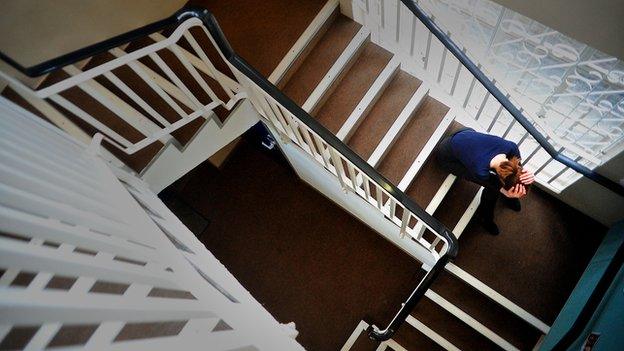Police cautions issued for sex crimes, arson and robbery
- Published

Rape Crisis said in "most cases" in which adult offenders were involved, cautions for rape were "inappropriate"
More than 1,000 sex offenders have received police cautions in the east of England rather than face court proceedings, it has emerged.
The figures, obtained by the BBC via a Freedom of Information request, reveal some of those cautioned admitted rape.
Police say cautions for serious offences are only issued under certain circumstances.
But abuse charities have said there should be a "zero tolerance" approach to crimes such as rape.
A caution is a formal warning issued by police to someone who has admitted a criminal offence. Intended for "low-level offending", cautions are issued at the discretion of police and enable a sanction to be given without going before the courts.
Police forces across the east of England have issued cautions for arson, house burglary, fraud and child abuse through prostitution or pornography.
They say cautions are only issued for serious offences after discussion with the Crown Prosecution Service and with consideration for the wishes of the victim, history of offending and "gravity of the offence".
But campaign groups have voiced particular concern at the use of cautions for sex offences.
Across the region, more than 1,000 cautions have been issued in the past five years for sexual offences, including rape. In nearly all cases those cautioned were adults.
But some forces using cautions for sexual offences say there can be compelling reasons for a caution to be used.
In Suffolk, eight cautions have been issued for rape - three in 2012 alone.
'Operational environment'
Det Insp Tonya Antonis, of Suffolk Police, said: "It is not something we do lightly."
All eight Suffolk rape cautions, she said, were issued to children who had either raped somebody within their family or a girlfriend who had been pressured into sexual activity under duress, such as the threat of the relationship being ended.
Cautions might also be issued to those with severe learning difficulties, she said.
Essex, Norfolk, Northamptonshire, Thames Valley, Cambridgeshire and Hertfordshire police forces did not separate rape cautions from the generic sexual offences category.
However, both Bedfordshire Police and Hertfordshire confirmed they had cautioned people for rapes of girls younger than 16. Hertfordshire also revealed it had issued a caution for child abuse "through prostitution and pornography".
Peter Saunders, chief executive of the National Association for People Abused in Childhood, said: "We take a pretty dim view of a system that would merely issue a caution for such serious crimes."
Acknowledging the complexity of some sex offence cases, Mr Saunders said: "There should be a zero tolerance approach, these are such serious crimes."
A spokeswoman for Rape Crisis said: "It is of real concern that there continues to be a large number of cautions given for sexual offences, and that there is such variation between police forces.
"In most cases involving adult offenders, cautions are wholly inappropriate.
"This issue shows how far the justice system has to go in improving its response to sexual offences.
"It is also critical that survivors of rape and sexual violence get support whether or not the matter is reported to the police."
A spokeswoman for Norfolk Police said cautions were "just one of the many outcomes available to constabularies" adding there "was very clear guidance" for how they should be used.
A review of the use of cautions is currently under way at the Ministry of Justice. It is expected to finish at the end of May.
A spokesman for the Association of Chief Police Officers (Acpo) said cautions should only be used for serious offences in "exceptional circumstances" and with the advice of prosecutors.
However, he said: "Discretion is key to policing and Acpo would support any police officer in using their discretion legitimately and proportionately in the best interests of victims and the communities they serve."
- Published24 April 2013
- Published18 March 2013